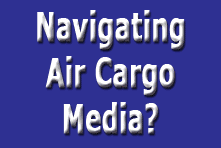
 he
2014 edition of Air Cargo India last week in Mumbai may be recalled as
the event where the Air Cargo Agents Association (ACAAI)—the body
representing the air cargo agents in the country—stood its ground.
ACAAI did not back down and actually took off the gloves, engaging in
a verbal fist fight with IATA and some others, including TIACA and even
a well-known industry icon. he
2014 edition of Air Cargo India last week in Mumbai may be recalled as
the event where the Air Cargo Agents Association (ACAAI)—the body
representing the air cargo agents in the country—stood its ground.
ACAAI did not back down and actually took off the gloves, engaging in
a verbal fist fight with IATA and some others, including TIACA and even
a well-known industry icon.
“Freight Forwarder Perspective In Indian Scenario” only lasted
one hour and forty five minutes, presented just before lunch last Wednesday,
February 5.
But as news goes, this session stood apart from the other meetings that
mostly dealt with air cargo doing business on the sub-continent.
This Freight Forwarder session revealed the basic problem between the
airlines and forwarders.
The session also offered a glimpse of just how heavily weighted some big
and vocal industry trade organizations are toward the airlines.
To hear it described, the interactive session got heated as sparks flew
and white hot passions lifted briefly; it got a bit out of hand. But that
moment also may have ended up blowing the lid off of a fragile truce between
the agents and IATA.
The main players were IATA Cargo boss
Des Vertannes, TIACA Chairman Oliver Evans, recently retired Ram Menen,
and a few other participants from the audience. Joining from the panel
was the soft-spoken Keshav Tanna, Vice President, FIATA, and Chairman
of the Air Freight Institute of FIATA.
In this discussion everyone had a point,
but no one yielded.
The comment that triggered the outcry
came from Ram Menen, who was sitting in the audience at the session. Menen
was at the show in Mumbai to receive the highest honor from the event
organizers for his lifetime of service to air cargo.
Interestingly, Ram, who has been absent
from industry events since last May, once again framed a debate for a
leading edge topic that is vital to the future success of air cargo—something
he had done again and again whilst serving as top executive at Emirates
SkyCargo before retiring last year to live in KL and Luxembourg.
Menen commented that since CASS could make
the back end costs more efficient, why were the forwarders so hesitant
to start using CASS?
“Why?” asked Menen adding:
“Certain things can be achieved by
working collectively,” he said.
The moderator of the round table, Sam Katgara,
seemed to have ignored the question.
But TIACA Chairman Oliver Evans and Des
Vertannes, who were near Ram Menen in the audience, kept pushing the Freight
Forwarder Perspective panel participants for an answer.
Joining Panel Moderator Sam Katgara, Partner,
Jeena & Company were Marcel Fujike, Senior Vice President Products
& Services Global Air Logistics, Kuehne + Nagel Management AG; Shabana
Khan, Senior Director, Air Freight, DHL Global Forwarding; Keshav Tanna,Vice
President, FIATA, & Chairman, Air Freight Institute, FIATA; S. L.
Sharma, President, Air Cargo Agents’ Association of India, Chairman
& Managing Director of Skyways Air Services Pvt. Ltd.; Michael “Mike“
Nicholson, Regional Cargo Manager Middle-East, Pakistan and Indian Subcontinent,
Qatar Airways and Bharat Thakkar, ACAAI’s immediate past President.
 |
It was during the Thakkar tenure that a petition
against IATA was filed with The Competition Commission of India (CCI).
To the Menen,Vertannes, and Evans troika,
Keshav Tanna replied that the freight forwarders were not against CASS
but wanted more time in the process —at least a week—to check
the invoices.
He was backed by DHL’s Shabana Khan,
who said that efforts had to be made to bring in more forwarders by showing
them the advantages of implementing CASS.
Ms. Khan also said that the authorities
needed to understand the local environment and the challenges faced by
the forwarders. Shabana then unexpectedly lashed out against e-freight,
pointing out that e-airway bills were “addressed in a partial manner”
and its uses were not easily “discernible in India.”
This was followed by a general uproar amongst
the agents in the audience claiming that the airlines were doing what
was useful for them without looking at the whole supply chain.
“Why couldn’t airlines push
the key stakeholders to toe their line?” was the question most oft
repeated.
IATA Vertannes attempted to bring things
together a bit, suggesting that everyone in the chain needed to join hands
and that the forwarders of India could also appeal to the Customs department
to help out.
But FIATA’s Tanna was having none
of that.
“If forwarders have to accept CASS
and e-freight, airlines, too, should come half way.
“Forwarders,” he said, “cannot
prepare both manual and electronic documents.”
For his part, Bharat Thakkar later said that the CASS question should
not have been brought up at all.
| Truce Does Not Include India?
|
For a moment last week in Mumbai, an
audience made up of shippers, forwarders, airline representatives, IATA,
and FIATA members apparently forgot, or unceremoniously ditched the “truce”
declared (or at least hoped for) by IATA Director General Tony Tyler last
year when the DG seemed to reach out to forwarders in what has been described
as his “working together speech.”
Tyler promised, “we can deliver the
solutions that will position air cargo to meet the needs of tomorrow’s
world.
“They are big, challenging, and definitely
worth all our efforts, ” the IATA chief told a room full of airlines
and forwarders last October at the FIATA Annual Meeting in Singapore.
| ACAAI Versus IATA Has Roots
|
The war and ongoing dust up between ACAAI
and IATA has continued for over a year.
In fact ACNFT
has exclusively reported about this mess in detail (click here)
and we have followed the story despite most of the ACAAI top brass’
refusal to comment on it or even give updates.
To understand the outburst at Air Cargo
India, there is a need to go back and set the stage.
A gauntlet was thrown down when ACAAI filed
a complaint against IATA alleging the charge that “many of the working
conditions of the International Air Transport Association (IATA) which
were forced upon the business of air cargo agents might fall under cartelization.”
A note issued by ACAAI stated that it had
written “a letter to the Competition Commission of India to examine
the position, and subsequently submitted a formal petition on December
21, 2012, utilizing as base for the complaint ‘information’
in ACAAI possession.
ACAAI’s petition, inter alia, submitted
that in the light of the provisions of the Competition Act, 2002, the
existing functioning and modalities of IATA in India could amount to complex
phenomena of cartelization both on ‘micro’ and ‘macro’
economic operational processes and, hence, may be in violation of Section
3 and 4 of the Competition Act, 2002.
In other words, ACAAI did not want to
find itself in a situation where, for any reason, if IATA was found to
be indulging in any anti-competitive practice in India, ACAAI would be
construed as an unwitting collaborator acting in concert with such practices,
whether voluntarily or otherwise.
In its letter to CCI, ACAAI asked the Commission
to examine the factual situation “regarding a chain of activities
such as unilaterally determining the polices that govern air cargo agents,
prescribing the qualification and conditions for the accreditation and
retention of air cargo agents, acting in a self-acclaimed regulatory capacity,
determining the commission (or its exclusion, for example, in recovering
fuel surcharge on behalf of the airlines) payable to agents, determining
norms for air cargo agents, and institutionalizing IATA in its various
operational bureaucracy would all amount to macroeconomic cartelization.
“It was further pointed out that determination
of financial criteria, penalty for non-compliance, exclusion of fuel surcharge
from payment of commission to agents as set out above, etc., which prejudicially
affected the air cargo agent so far, would amount to microeconomic cartelization.”
It is no wonder the flashpoint last week
was CASS.
In its letter to CCI, ACAAI also said that
the association had in addition to the cartelization charge also found
that “IATA and IATA India were all set to introduce and implement
a new Cargo Accounts Settlement System (CASS) in India.”
ACAAI was concerned that the implementation
of CASS would be prejudicial to the air cargo agents and thus ought to
be put on hold until the investigation was concluded, and a decision was
rendered by CCI.
It must be mentioned here that CASS has
not been introduced in India because most of the small freight forwarders
in the country feel that the system is partial to the carriers and does
not allow them to take a fixed commission.
Tirthankar Ghosh |






